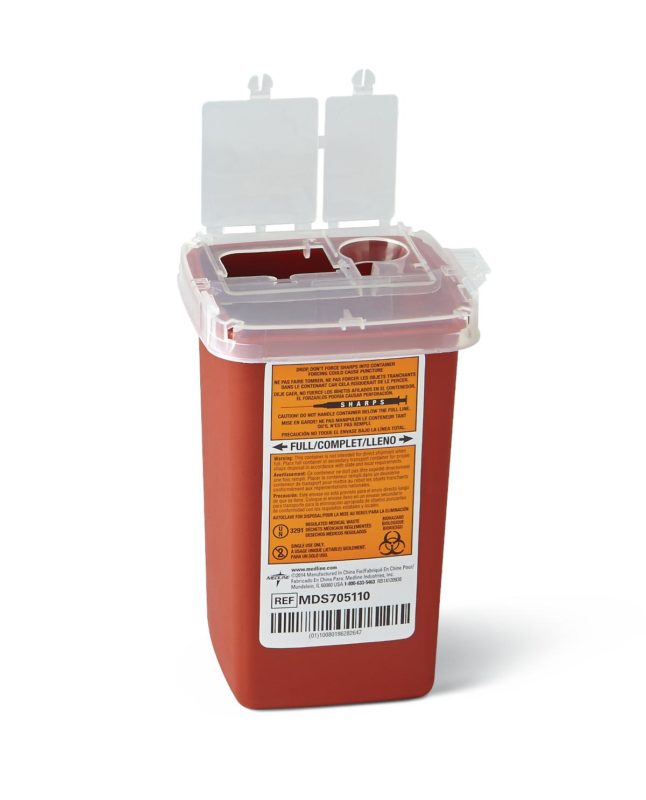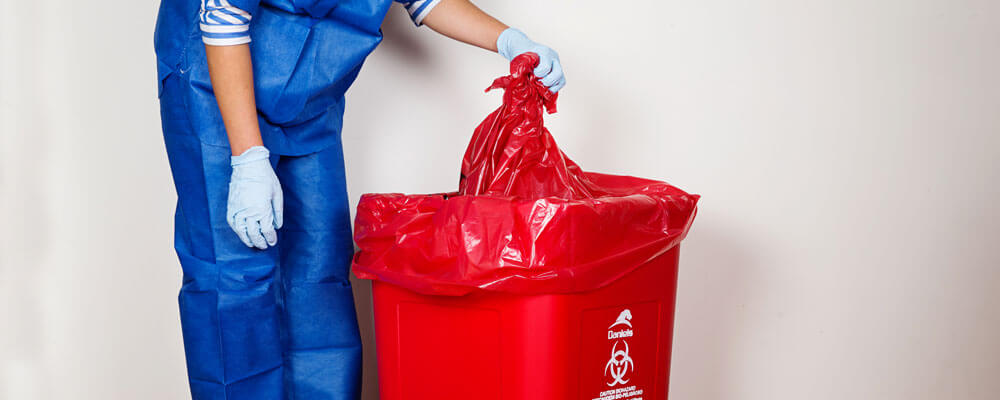Reducing Dangers and Protecting Public Wellness: The Role of Medical Waste Disposal
In today's globe, where public wellness issues are continuously on the surge, the appropriate management and disposal of medical waste play a crucial function in decreasing dangers and safeguarding the well-being of neighborhoods. By delving right into this topic, we will certainly uncover the essential role clinical waste disposal plays in securing public wellness and the environment.
Value of Appropriate Clinical Garbage Disposal
Appropriate clinical waste disposal is of utmost importance in ensuring the security of health care employees and the basic public. medical waste disposal services with WasteX. Medical waste, which consists of things such as used needles, syringes, infected materials, and pharmaceutical waste, presents significant wellness threats otherwise dealt with properly
The key factor for correct medical garbage disposal is to prevent the transmission of contagious diseases. Health care employees are specifically vulnerable to contracting and spreading out illness through direct exposure to contaminated waste. By executing ideal disposal techniques, such as using puncture-resistant containers and making certain the appropriate partition of various sorts of waste, the danger of infection can be reduced.
In addition, proper clinical waste disposal is essential for securing the atmosphere. Some clinical waste contains hazardous chemicals and materials that can infect dirt and water resources if not taken care of properly.
Along with protecting human health and the setting, correct clinical waste disposal additionally plays a role in maintaining the online reputation and trust fund of healthcare establishments. Proper disposal techniques demonstrate a dedication to security and expertise, which is vital for preserving public confidence in medical care solutions.
Dangers Connected With Inadequate Medical Waste Administration
Inadequate clinical waste monitoring presents substantial risks to public health and wellness and the atmosphere. Incorrect disposal of clinical waste can cause the spread of transmittable conditions, contamination of water sources, and the launch of hazardous chemicals right into the setting. Among the primary risks related to poor clinical waste management is the transmission of infections. When clinical waste, such as made use of syringes or polluted dressings, is not taken care of effectively, it can come into call with individuals, causing the spread of diseases such as HIV, liver disease B, and consumption.
Another threat is the contamination of water sources. Improper disposal of medical waste can bring about the release of damaging chemicals and microorganisms into water bodies, polluting the water and presenting a danger to both human and animal health. This contamination can happen with the inappropriate disposal of drugs or the discharge of without treatment medical waste into water bodies.
Additionally, inadequate clinical waste administration can cause the launch of poisonous chemicals right into the atmosphere. Several clinical items contain unsafe compounds, such as mercury, lead, or radioactive products. If these products are not dealt with properly, they can seep right into the soil or water, positioning a threat to ecological communities and human health and wellness.

Efficient Strategies for Medical Waste Handling
Implementing risk-free and reliable methods for the handling of clinical waste is essential in making sure the protection of public wellness and the atmosphere. Clinical waste, such as sharps, polluted products, and pharmaceuticals, can pose substantial dangers otherwise taken care of correctly. To minimize these risks, healthcare facilities need to adopt effective methods for clinical waste handling.
One secret approach is segregation. Appropriate partition involves separating different sorts of waste at the factor of generation. This aids prevent cross-contamination and makes certain that each kind of waste is treated and taken care of correctly. Medical care centers ought to supply clear standards and training to staff on exactly how to set apart waste correctly.
Another vital method is the use of safe containers (medical waste disposal services with WasteX). Clinical waste must be kept in leak-proof and puncture-resistant containers that are classified properly. These containers need to be securely near prevent any spills or leaks during transportation and storage space. Routine evaluations and upkeep of these containers are needed to ensure their honesty.
Proper documentation is also crucial for reliable medical waste handling. Health care facilities must keep exact records of the type and amount of waste created, in addition to the disposal methods made use of. This documentation helps in monitoring and surveillance waste management methods, making certain compliance with regulations, and recognizing locations for improvement.
Lastly, medical care centers ought to develop clear protocols for the transport and disposal of clinical waste. This consists of dealing with respectable and certified waste management companies that follow correct handling, treatment, and disposal procedures. Routine audits and evaluations should be carried out to confirm compliance with regulations and sector finest techniques.

Laws and Guidelines for Clinical Garbage Disposal
To ensure the anchor correct and risk-free monitoring of clinical waste, healthcare facilities have to abide by standards and regulations developed by appropriate authorities. These guidelines and policies are implemented to protect public health, protect against ecological contamination, and reduce the risk of transmittable diseases.
In numerous nations, such as the United States, the management of medical waste goes through stringent policies imposed by federal government firms such as the Epa (EPA) and the Occupational Safety and Wellness Management (OSHA) These guidelines lay out the requirements for the partition, packaging, labeling, storage space, transportation, and disposal of medical waste. medical waste removal near me. They also provide guidelines on using personal protective equipment (PPE) and the application of infection control procedures
Medical care centers are needed to develop and implement comprehensive medical waste administration plans that address all aspects of waste handling. These plans must include treatments for waste segregation, the use of appropriate containers, worker training on waste monitoring methods, and routine surveillance and auditing of waste handling procedures.
Furthermore, health care centers should maintain precise records of their waste monitoring tasks and ensure that waste disposal is executed by qualified and certified waste management companies (medical waste disposal services with WasteX). Non-compliance with these regulations can lead to fines, penalties, and lawful repercussions
Advantages of Safe Medical Garbage Disposal for Public Health And Wellness
Correct adherence to regulations and standards for clinical garbage disposal not just makes certain the secure monitoring of waste yet additionally offers considerable benefits for public wellness. The secure disposal of clinical waste plays a critical function in preventing the spread of contagious illness and protecting the well-being of health care workers, patients, and the general public.
One of the main advantages of safe medical waste medical waste disposal services with WasteX disposal is the reduction of disease transmission. Clinical waste, such as used needles and contaminated products, can nurture contagious microorganisms that present a major danger to human health.
Moreover, safe clinical garbage disposal also aids to alleviate ecological pollution. Improper disposal of clinical waste can bring about the contamination of air, dirt, and water, which can have detrimental impacts on environments and public wellness. By following correct disposal methods, the threat of environmental air pollution is reduced, guaranteeing the wellness of both humans and the environment.
On top of that, proper medical garbage disposal practices additionally contribute to the overall efficiency and sustainability of health care systems. By carrying out risk-free disposal techniques, medical care centers can lower the danger of crashes, injuries, and infections amongst their team, bring about improved productivity and lowered healthcare costs.
Verdict
In conclusion, ensuring proper clinical waste disposal is essential for lowering threats and shielding public health. Inadequate administration of clinical waste positions substantial risks, such as the spread of infections and environmental pollution. Effective strategies, together with guidelines and guidelines, play a critical function in taking care of clinical waste securely. By applying risk-free medical garbage disposal practices, we can secure public wellness and produce a healthier environment for all.
In today's globe, where public wellness issues are frequently on the increase, the appropriate management and disposal of clinical waste play an essential role in decreasing risks and securing the wellness of communities. By diving right into this subject, we will reveal the critical function medical waste disposal plays in protecting public health and wellness and the environment.
Improper disposal of clinical waste can lead to the release of unsafe chemicals and pathogens into water bodies, contaminating the water supply and presenting a risk to both human and animal health and wellness.In final thought, ensuring appropriate clinical waste disposal is important for look at here lowering threats and safeguarding public health. By carrying out secure medical waste disposal techniques, we can safeguard public wellness and create a much healthier setting for all.